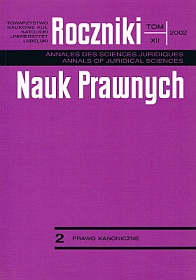From the Problems of Teaching Canon Law in Jesuit Studies in the 17th and 18th centuries
Abstract
The article is a continuation of the author's research of teaching the law, and especially canon law, in monastic studies in the 17th and 18th centuries. The research was preceded by an article generally devoted to the teaching of law in monastic studies in the 17th and 18th centuries that was published in the periodical Prawo-Administracja-Kościół (2-3 (2000), pp.85-99). In the present article, with the use of the recently published compendium of the knowledge about Jesuits in Poland entitled Encyklopedia wiedzy o jezuitach na ziemiach Polski i Litwy 1564-1995 (compiled by Ludwik Grzebień SJ with the co-operation of a Jesuit team, Publishing House WAM, Cracow 1996) and of the literature of the subject, the author tries to look more closely at the issue of teaching canon law in the Jesuit order in Poland in the 17th and 18th centuries. He focuses on those two centuries for two reasons. Firstly, they were the period in which teaching canon law was only introduced to monastic studies, including Jesuit ones. Secondly, because it is for this period that the issue generally has not been undertaken and hence it is not widely known. The author's considerations resulted in a few interesting statements. It turns out that the process of introducing the teaching of canon law into the curriculum of Jesuit studies, like in the case of other orders, was very slow. This was closely connected with the fact that canon law, like history of the Church, was for a long time an auxiliary discipline and it was taught within theology, first of all moral theology. However, as soon as they became convinced that canon law should be taught, Polish Jesuits put this postulate into practice in a lot of their colleges. In this respect they followed the example of Akademia Wileńska (the Vilnius Academy), where as early as the forties of the 17th century the chair of canon law was established. Jesuit professors of canon law did not limit themselves to teaching but they also prepared theses for discussion and they wrote dissertations about this discipline. This work resulted in a situation which gave them a decided advantage in this respect over the other orders, where until the end of the period in question teaching canon law was treated as a matter of secondary importance.
Copyright (c) 2002 Roczniki Nauk Prawnych

This work is licensed under a Creative Commons Attribution-NonCommercial-NoDerivatives 4.0 International License.


